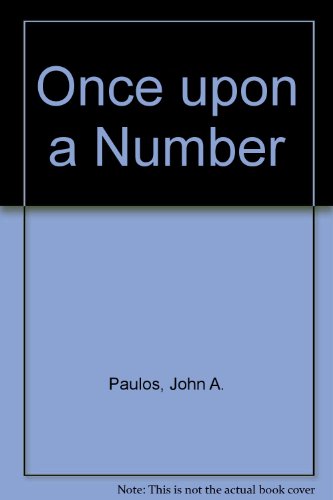Items related to Once Upon a Number

What two things could be more different than numbers and stories? Numbers are abstract, certain, and eternal, but to most of us somewhat dry and bloodless. Good stories are full of life: they engage our emotions and have subtlety and nuance, but they lack rigor and the truths they tell are elusive and subject to debate. As ways of understanding the world around us, numbers and stories seem almost completely incompatible.Once Upon a Number shows that stories and numbers aren't as different as you might imagine, and in fact they have surprising and fascinating connections. The concepts of logic and probability both grew out of intuitive ideas about how certain situations would play out. Now, logicians are inventing ways to deal with real world situations by mathematical means by acknowledging, for instance, that items that are mathematically interchangeable may not be interchangeable in a story. And complexity theory looks at both number strings and narrative strings in remarkably similar terms.Throughout, renowned author John Paulos mixes numbers and narratives in his own delightful style. Along with lucid accounts of cutting-edge information theory we get hilarious anecdotes and jokes; instructions for running a truly impressive pyramid scam; a freewheeling conversation between Groucho Marx and Bertrand Russell (while they're stuck in an elevator together); explanations of why the statistical evidence against OJ Simpson was overwhelming beyond doubt and how the Unabomber's thinking shows signs of mathematical training; and dozens of other treats. This is another winner from America's favorite mathematician.
"synopsis" may belong to another edition of this title.
Review:
Mathematician John Allen Paulos bravely bridges the scientific and literary cultures with this amusing, enlightening look at numbers and stories. If you think those two things go together like a "horse and a paperclip," as Allen wryly observes, you only have to look at phenomena like the Bible codes, the stock market's ups and downs, and the Clinton sex scandal to begin to understand the hidden bonds between them. Put simply, mathematics can describe everything that happens, and everything that happens contextualizes mathematics. In demonstrating this, Paulos continues the noble numeracy crusade he began with A Mathematician Reads the Newspaper and Innumeracy. Perhaps the most compelling thought experiments in the book are those of the statistics of stereotyping and race relations. Paulos shows, mathematically, that minority status makes achieving equality extraordinarily difficult.
From the Author:
If you want to keep hold of your comfortable worldview, don't read Once Upon a Number. But you'll be missing out on an unforgettable reminder of what chance, coincidence, and odds really mean, along with several valuable life lessons that may help you understand lost socks, racism, and mistaken identity. --Therese Littleton
Like at least 62.212% of us, I've often felt a tension between stories and statistics and their very different logics and mind-sets. I've always been struck, for example, by how frequently people feel that they've been wronged or aggrieved and how infrequently they feel that they've wronged or aggrieved someone else. How could we all be so Lake Wobegone above average? This led me to think not only about the differences between narratives and numbers but also about those between subjective viewpoint and objective probability, between informal discourse and formal logic, between meaning and information. The book that resulted, this book, is a sort of mathematician's take on C.P. Snow's two cultures, the literary and the scientific, and is my attempt to bridge, or at least illuminate, the gap between them. The stress is on examples, vignettes, parables, stories, puzzles, and a few memoiristic segments. Topics include the Bible codes, the statistics of racism and stereotyping, twenty questions and "magical realism," the probability of Murphy's Law, the mathematics of humor, O.J. Simpson and the Unabomber, the role of common knowledge in the stock market, information theory versus literary criticism, and much more.
"About this title" may belong to another edition of this title.
- PublisherNelson Thornes Ltd
- ISBN 10 0173993141
- ISBN 13 9780173993149
- BindingPaperback
(No Available Copies)
Search Books: Create a WantIf you know the book but cannot find it on AbeBooks, we can automatically search for it on your behalf as new inventory is added. If it is added to AbeBooks by one of our member booksellers, we will notify you!
Create a Want
